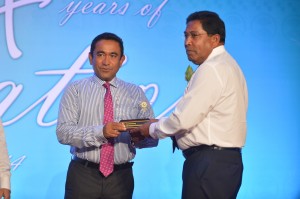Parliament’s economic affairs committee completed its review of the government’s flagship special economic zone (SEZ) legislation yesterday and sent the bill to the People’s Majlis floor with minor revisions.
While Jumhooree Party (JP) and opposition Maldivian Democratic Party (MDP) MPs had boycotted meetings last week, the committee resumed the review process yesterday after JP Leader Gasim Ibrahim assured cooperation for continuing the assessment.
However, Gasim and JP MP Abdulla Riyaz reportedly left the meeting later and the bill was voted through with only MPs of the ruling Progressive Party of Maldives (PPM) and coalition partner Maldives Development Alliance (MDA) in attendance.
Reflecting its combined 48 seats in the 85-member house, the PPM-MDA coalition has voting majorities on key oversight committees.
Among the amendments brought to the draft legislation, a provision was added to include an MP on a 17-member investment board, which would demarcate and oversee the SEZs.
JP and MDP MPs had walked out of a committee meeting last week alleging procedural violations by the committee’s chair – PPM MP Abdulla Khaleel – and objecting to his alleged refusal to incorporate recommendations made by various state institutions.
The MPs in the minority accused pro-government MPs of deliberately disregarding their input.
Khaleel told newspaper Haveeru yesterday that suggestions from state institutions were included to the extent that “the bill’s main concept would not be lost”.
“Dangerous”
MDP MPs did not attend yesterday’s committee meetings.
Last week, the main opposition party announced protests against passing the bill in its current form, warning of “dangerous” consequences, contending that it would pave the way for drug trafficking, money laundering, and human trafficking.
After boycotting the committee last week, Gasim had also warned that an SEZ law would facilitate massive corruption, threaten independence and sovereignty, and authorise a board formed by the president “to sell off the entire country in the name of economic zones.”
Meanwhile, at a press conference on Saturday (August 16), PPM Parliamentary Group Leader Ahmed Nihan accused opposition MPs of obstructing implementation of the government’s economic policy.
The majority leader urged MDP MPs to respond to technical aspects of the bill in lieu of “misleading” political rhetoric.
The government maintains that SEZs with relaxed regulations and tax incentives were necessary both for foreign investors to choose the Maldives over other developing nations and to launch ‘mega projects,’ which President Abdulla Yameen has said would “transform” the economy through diversification and mitigate the reliance on the tourism industry.
Yameen has also dismissed concerns with the absence of parliamentary oversight in the legislation – such as requiring parliamentary approval for presidential appointees to the investment board – arguing that that leasing islands or plots of land was the prerogative of the executive and that affairs of governance was outside the Majlis’ mandate.
Filibuster
At today’s sitting of parliament, MDP MPs raised consecutive points of order – for nearly half an hour – contending that the committee completed its review with unprecedented and undue haste after ignoring the views of opposition MPs.
PPM MPs meanwhile urged Speaker Abdulla Maseeh Mohamed to exercise his authority to expel unruly MPs.
However, unable to continue with the day’s agenda, Speaker Abdulla Maseeh Mohamed adjourned proceedings twice.
Following the adjournment, the MDP parliamentary group informed the press that its MPs were protesting in the chamber against efforts to “silence” the minority party as well as the fast-tracking of the SEZ bill review despite assurances from the speaker that opposition concerns would be heard.
At a press briefing yesterday, MDP MP Ibrahim Shareef said pro-government MPs did not allow opposition MPs to amend the draft legislation and insisted that the review process was conducted “dictatorially” in violation of parliamentary rules.
Shareef had warned that MDP MPs were willing to bring Majlis sittings to a halt over the SEZ bill.
The MDP has been holding nightly rallies at its haruge (meeting hall) in Malé to protest “openly selling off the country” through SEZs.
Following last night’s rally, a group of protesters took to the streets and demonstrated in front of President Yameen’s private residence.
The MDP has also launched a petition (Dhivehi) calling on the government to withdraw the SEZ bill, warning that it would “destroy” the decentralisation system as the president could bypass local councils, declare any region an economic zone, and lease land for a period of 99 years.
In addition to import duty and tax exemptions for investors, an SEZ law would allow the president to “divide and distribute various regions of the country” to businesses of senior government officials, the party claimed.
Moreover, companies with foreign shareholders would be able to purchase land without paying sales tax, the MDP noted, which would pose a threat to national security.
“This would be selling off the country’s natural resources dubiously on the cheap for the benefit of a few people,” reads the petition.

